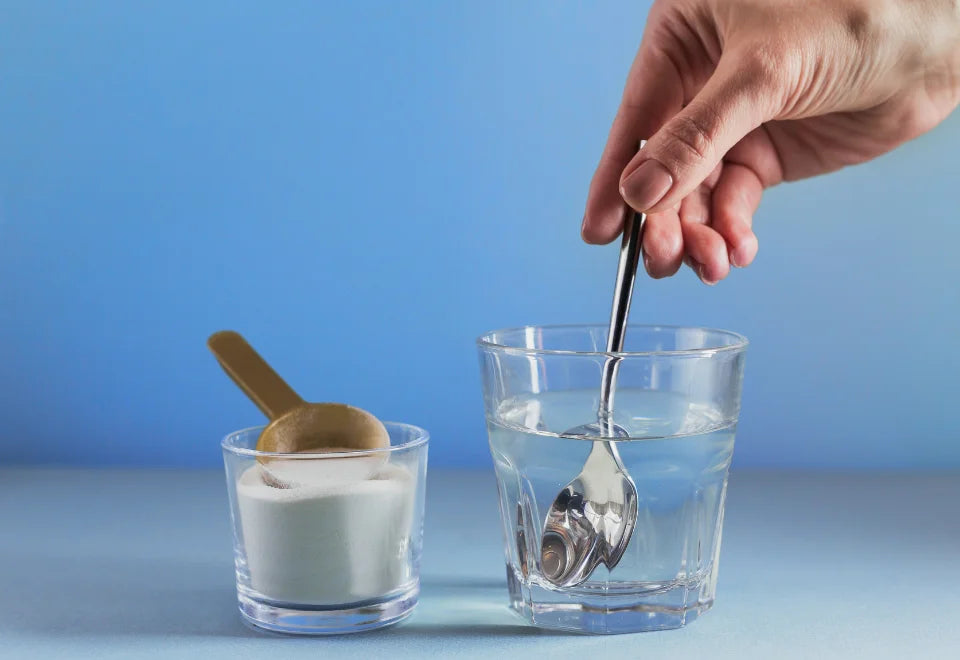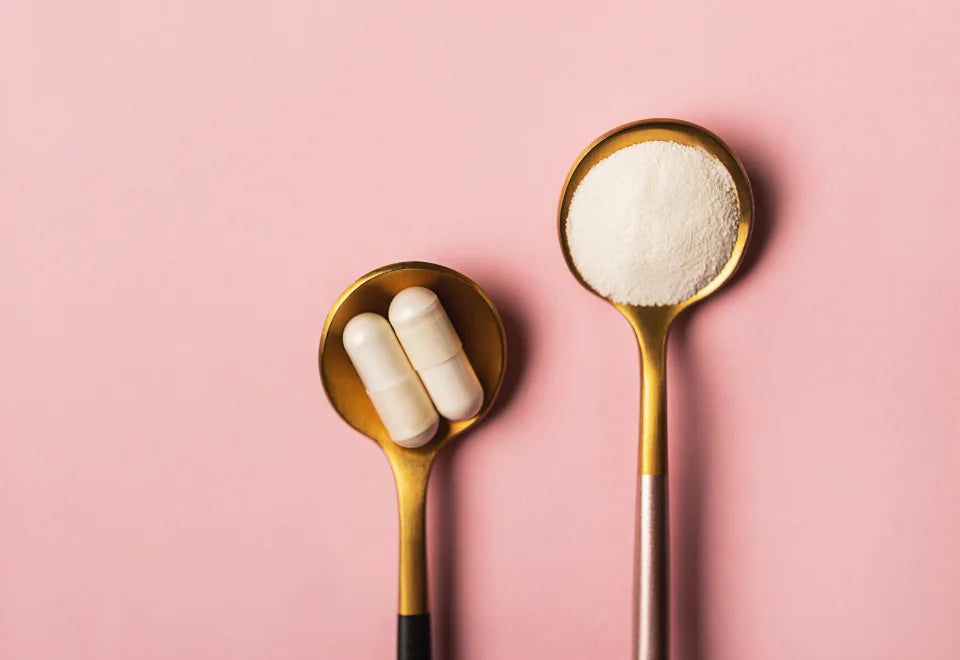Collagen is a structural protein that plays an essential role in maintaining the integrity, elasticity, and strength of various tissues in our body. As we age, the production of collagen naturally declines, which can have noticeable effects on our skin, joints, bones, and overall health. Understanding the significance of collagen in the ageing process and its role in longevity is key to maintaining vitality and a high quality of life as we grow older.
Health Benefits of Collagen
Skin Health and Anti-Ageing Effects
Collagen supplements can boost skin elasticity by up to 40%, reduce wrinkles, and improve hydration levels. Research shows that collagen peptides, especially when combined with certain bioactive compounds, can enhance skin texture, help retain moisture, and improve overall appearance.
Joint and Bone Strength
Studies indicate that collagen supplements can lower joint pain by 43% and improve joint mobility by 39% [1]. This can be particularly helpful for those dealing with age-related joint issues. Collagen also plays a key role in bone health by creating a framework for mineralization, which helps maintain flexibility and strength as we get older.
Muscle and Heart Health
Collagen is a crucial part of the connective tissue that surrounds muscles, helping to support their strength and flexibility. It also benefits cardiovascular health by reinforcing blood vessels, making them more resilient and aiding healthy blood circulation. These structural benefits contribute to proper blood flow and help regulate blood pressure.
For best results, daily collagen intake typically ranges from 2.5g to 10g, depending on individual health goals [2]. Many people notice improvements after several weeks of regular use. Keeping collagen levels steady through diet, lifestyle choices, or supplements is an effective way to support these health benefits.
Natural Ways to Increase Collagen
Now that you know how collagen benefits your body, let’s dive into natural ways to maintain and support its levels.
Foods That Provide Collagen
Bone broth, made by simmering animal bones, is packed with collagen peptides that help keep skin and joints healthy. Other great options include gelatin-rich meats, fish with edible bones (like sardines), and fish skin.
Nutrients That Help Collagen Production
Certain nutrients play a key role in collagen production. Below is a breakdown of these nutrients, their sources, and how they contribute:
| Nutrient | Food Sources | Role in Collagen Production |
|---|---|---|
| Vitamin C | Citrus fruits, bell peppers, strawberries | Helps produce collagen |
| Vitamin E | Almonds, sunflower seeds, avocados | Shields collagen from damage |
| Zinc | Oysters, pumpkin seeds, beef | Aids in collagen formation |
| Copper | Organ meats, sesame seeds, dark chocolate | Activates enzymes that build collagen |
Lifestyle Tips to Protect Collagen
Keeping the collagen you already have is just as important as making more. Smoking can drastically lower collagen levels, so quitting is a must for protecting your skin and overall health.
UV rays also break down collagen, so daily sunscreen (SPF 30 or higher) is non-negotiable. Wear protective clothing and try to avoid the sun during peak hours (10 AM to 4 PM).
Exercise, especially resistance training, can promote collagen production. Aim for at least 150 minutes of moderate activity each week, including 2–3 strength training sessions.
Hydration is another key factor. Drink at least 8 glasses of water daily and eat water-rich foods like cucumbers and watermelon to keep your skin hydrated.
While these natural strategies can make a big difference, collagen supplements can also help fill the gap as you age.
sbb-itb-55c436e
Guide to Collagen Supplements
Different Forms of Collagen Supplements
Collagen supplements come in various forms, each offering unique benefits depending on your health goals.
- Hydrolyzed collagen (also known as collagen peptides) is the most popular due to its high absorption rate, making it ideal for improving skin elasticity, supporting joint health, and aiding muscle recovery.
- Gelatin, a cooked form of collagen, is less efficiently absorbed but still benefits digestive health and supports joint wellness.
- Collagen powder, typically hydrolyzed, is highly absorbable and easy to mix into drinks, providing benefits for skin, joints, and anti-ageing.
- Liquid collagen is another fast-absorbing form, perfect for skin hydration and promoting a youthful appearance.
- For those seeking convenience, collagen capsules or tablets are an easy-to-take option, supporting joint health and bone strength, though they’re absorbed more slowly.
- Bone broth, a natural source of collagen, offers digestive and joint support, though it contains gelatin, which is less readily absorbed.
- Marine collagen, derived from fish, is especially effective for enhancing skin health, hair, and nails due to its high bioavailability.
Each form, from powders to broths, offers specific advantages based on absorption rates and targeted benefits, allowing you to choose the one that best fits your needs for skin, joint, and overall health.
|
Supplement Form |
Absorption Rate |
Best Used For |
|
Hydrolyzed Collagen/Peptides |
High |
Skin health, joint health, muscle recovery |
|
Gelatin |
Moderate |
Digestive health, joint health |
|
Collagen Powder |
High |
Skin health, joint support, anti-ageing benefits |
|
Liquid Collagen |
Very High |
Skin hydration, anti-ageing, youthful appearance |
|
Collagen Capsules/Tablets |
Moderate |
Joint health, bone strength, general health |
|
Bone Broth |
Moderate to High |
Gut health, joint support, skin hydration, bone health |
|
Marine Collagen |
Very High |
Skin health, hair and nails growth, anti-ageing |
What Supplements Can and Cannot Do
Collagen supplements are effective in supporting skin elasticity, joint function, bone strength, and muscle recovery. However, they are not a cure-all. Studies show they can improve skin elasticity and reduce wrinkles over time. Results often require consistent use over 8-12 weeks. It’s important to remember that these supplements work best when combined with a healthy lifestyle rather than being relied on as a standalone fix.
Choosing Quality Supplements
To get the best results from collagen supplements, keep these factors in mind:
- Source quality: Opt for products that clearly state their collagen source, such as bovine, marine, or chicken.
- Manufacturing standards: Look for supplements made in FDA-approved and GMP-certified facilities.
- Third-party testing: Check for certifications from independent quality testing.
A daily dose of 2.5-15 grams is typically effective, depending on factors like age and body weight. To maximize benefits, stick to a consistent daily routine and pair supplementation with a balanced diet and regular exercise.
Adding collagen supplements to your routine is just one step. Up next, we’ll discuss how to combine them with other health practices for even greater long-term benefits.
Adding Collagen to Your Health Plan
Collagen and Other Health Practices
Building a solid collagen routine works best when paired with healthy habits. Here are some strategies that support collagen production:
| Health Practice | How It Helps Collagen Production | How to Incorporate It |
|---|---|---|
| Sleep Quality | Promotes cellular repair | Aim for 7-9 hours nightly |
| Exercise | Boosts blood flow to connective tissues | Do 30 minutes, 5x per week |
| Stress Management | Minimizes collagen breakdown | Practice daily relaxation techniques |
| Nutrition | Aids collagen synthesis | Eat foods high in Vitamin C |
Measuring Health Improvements
Once you've adopted these practices, it's important to track how they're working for you. Research suggests that sticking to collagen supplementation can improve skin elasticity and hydration within 8-12 weeks [3].
Key areas to monitor include:
- Skin health: Check for improved elasticity and hydration.
- Joint health: Note any changes in mobility and comfort.
- Exercise recovery: Observe how quickly you bounce back after workouts.
- Energy levels: Track overall vitality and daily energy.
How Decode Age Helps?
As we age, the body’s collagen production decreases, leading to visible signs of ageing, such as wrinkles, sagging skin, and joint discomfort. OptiAge collagen peptide offers a solution to combat these effects with its scientifically backed formula. OptiAge combines high-quality hydrolyzed collagen peptides with other bioactive compounds, such as hyaluronic acid, vitamin C and more, to maximize absorption and effectiveness.
By boosting collagen levels in a natural, bioavailable way, Decode Age supports both internal and external wellness, providing long-term benefits to skin, joints, muscles, and overall well-being.
Conclusion: Taking Action for Better Health
Collagen is not just important for aesthetics—it's a crucial element in maintaining overall health and vitality as we age. By supporting skin health, joint flexibility, bone strength, and muscle function, collagen plays a significant role in enhancing longevity and quality of life. While natural collagen production declines with age, incorporating collagen-rich foods, supplements, and lifestyle practices can help mitigate this decline, allowing you to age gracefully and with vitality.
So, whether you're looking to maintain youthful skin or keep your joints healthy, paying attention to collagen could be the key to a longer, more fulfilling life.
FAQs
What is collagen, and why is it important for ageing?
Collagen is a protein that provides structure, elasticity, and strength to our skin, joints, bones, and muscles. As we age, collagen production naturally decreases, leading to visible signs of ageing like wrinkles and joint discomfort. Collagen supplements can help restore these levels and support overall health and vitality.
How do collagen supplements work?
Collagen supplements, particularly hydrolyzed collagen peptides, are broken down into smaller molecules that are easily absorbed by the body. They help improve skin elasticity, reduce wrinkles, support joint health, and aid in muscle recovery by boosting collagen levels in various tissues.
How long does it take to see results from collagen supplements?
Typically, it takes 8-12 weeks of consistent collagen supplementation to notice visible improvements in skin elasticity, hydration, and joint comfort. Results may vary based on individual health goals.
Can collagen supplements help with joint pain?
Yes, studies show that collagen supplements can help reduce joint pain by supporting cartilage and improving joint mobility. Regular use of collagen can alleviate discomfort, particularly for those with age-related joint issues.
What are the best forms of collagen supplements?
Collagen is available in various forms, including powders, capsules, liquid, and bone broth. Hydrolyzed collagen peptides are the most popular due to their high absorption rate. Liquid collagen offers fast absorption, while capsules are convenient for daily use. Bone broth, a natural collagen source, provides additional digestive and joint benefits.
What foods can help boost collagen production naturally?
Foods rich in collagen, such as bone broth, fish skin, and gelatin-rich meats, can support your body’s collagen levels. Additionally, consuming nutrient-rich foods like citrus fruits (Vitamin C), pumpkin seeds (Zinc), and dark chocolate (Copper) can help stimulate natural collagen production.
Are there any side effects of taking collagen supplements?
Collagen supplements are generally considered safe for most people. However, some individuals may experience mild digestive discomfort or allergic reactions. If you have concerns, it’s always a good idea to consult with a healthcare provider before starting any supplement.
How can I maintain collagen production as I age?
In addition to taking collagen supplements, you can maintain collagen production by following a healthy lifestyle, including eating a nutrient-rich diet, exercising regularly, staying hydrated, and protecting your skin from sun damage with daily sunscreen use.
Can collagen supplements improve my skin’s appearance?
Yes, collagen supplements have been shown to improve skin elasticity, reduce wrinkles, and enhance hydration. Consistent use can help you maintain a youthful, glowing complexion.


























Leave a comment
All comments are moderated before being published.
This site is protected by hCaptcha and the hCaptcha Privacy Policy and Terms of Service apply.